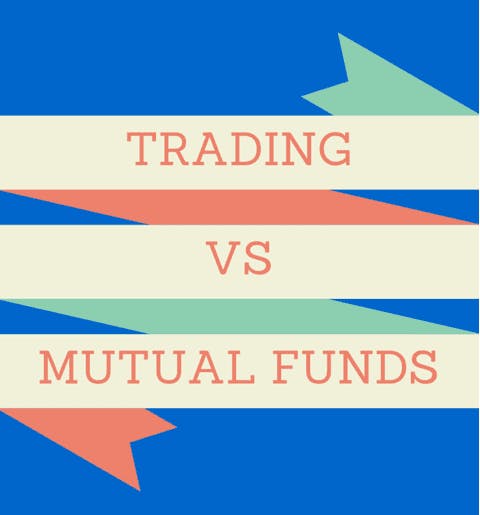
With record inflows in equity mutual funds in the last 2 years, the question everyone seems to be asking is,” Which are best performing Mutual Funds?” But have the new class of investors who want to know the of these top performing mutual funds, ever tried to compare and see if direct investing and trading suits them better? One needs to understand that the distinction between these two very different approaches.
Flexibility:
Investing in mutual funds is a passive approach. All you have to do is choose a scheme and hope for it to do well. You will have no scope to influence the portfolio in any way. So the way to deal with it is by diversifying between different mutual funds. On the contrary, direct investing in equity shares gives you the flexibility to tailor make your portfolio based on your risk appetite. You can and sell shares whenever you want without any restrictions. You can buy and sell a mutual fund at any time too, but you won’t be able to customize it as the decision-making is outsourced to the Fund Manager.
Profit potential:
Investing directly can give you more returns than mutual funds. Sometimes, the difference can be exponential. Successful traders are capable of making and do often make triple digit returns in a year. As a concept, mutual fund managers try to deliver basic returns in tandem with the overall performance of the benchmark indices (NIFTY/SENSEX/Other related index). This is because since they manage money of many individuals in one common pool account and have to abide by the industry norms of diversification, risk management and portfolio rebalancing. So basically, they are risk averse. Capital preservation is their first priority as opposed to delivering great returns. Although both are inter-linked, the priorities make a big difference and it shows up, in the end result. They deliver about 13-15% annualized returns on a long term basis. Here’s the latest performance report of the best large-cap funds in India ranked by Crisil.

Let’s take the best performing fund (SBI Blue Chip Fund) over a 5 year time frame and calculate it’s compounded annual return (CAGR) using https://fyers.in/compound-rate/:

As you can see, the year on year growth is much lesser than projected. Annualized returns paint a deceptive picture of growth as it tends to represent the long-term returns as smooth and linear in nature. If you compare the returns with a few companies which have performed well during the same time frame, you will see a great difference even if you just had a buy and hold strategy:
Performance of Asian Paints in the last 5 years is CAGR of 25.64% (Annualized return = 43%)

Direct investing gives you the opportunity of investing in high growth companies, timing the market, and using different instruments in derivatives. You can manage your money more aggressively and expect a much higher double-digit growth by reducing diversification and using derivatives in a smart way. Speaking of derivative instruments, the use of leverage via futures and options can give you an edge to manage your risk more appropriately.
Risk Management:
When you invest in a mutual fund, your only risk management tool is to diversify into more funds or sell your units. The fund manages your risk by diversifying among different sectors and stocks. Whereas in trading, you can do a lot more than that and you have many choices to manoeuvre. For instance, apart from just diversifying or selling your stocks, you can use options strategies like (Covered Call, Protective Put, long and short Straddles etc.) to manage your risk and generate returns that would otherwise not be possible via mutual funds. Also, when you are trading derivatives you can diversify more in the short term because the leverage provided can give more firepower to your available capital. The use of stop losses are an added advantage to this approach.
Activity:
Direct investing/trading will require you to be more vigilant of the market movements. It is an active approach and you will feel more involved in the process as opposed to Mutual funds. This is because investing in Mutual funds online is a one-time decision-making process and you will have no clue as to how your money is being managed on your behalf. Since you won’t be involved in the process, you will never be sure whether you’re making the progress that you actually expect or you think you deserve.
Periodicity:
Mutual funds give you an advantage in this space if you want to invest a fixed sum of money every month. Systematic Investment Plans (SIPs) are the answer if you want to invest and accumulate incrementally invested capital over the long term. SIPs in stocks also exist but since they are focused on individual stocks, you’ll have to engage in more than one to make the idea feasible and achieve the desired levels of diversifications. If you prefer accumulating specific stocks, then you should try this out. You can invest small lump-sums in the markets directly by accumulating say three month worth of SIPs. One downside of SIPs is that over the long term, your investment price is going to be close to the long-term average and this can be an advantage or disadvantage depending on the market cycle.
Time Period:
In trading, you can choose any timeframe which will suit your needs. You can choose the risk you want to take, time duration of your trades both for the short term and long term. You can customize it the way you want to fit your needs. For example, a day trader who wants to make quick profits has a time horizon of only one day or less whereas an investor can have a horizon for more than 5 years. There are no rules and you can change your strategy whenever you feel like. But when investing in mutual funds either online or by taking the advice of your financial planner, the product is built to create long-term wealth and in the short run it gives you very little returns.
Timing:
It is essential to time the markets (buy and sell at an appropriate time) to make superior returns. This is true both in the short term and long term. Mutual fund marketers and fund houses often argue that market fluctuations should be ignored and that timing the markets is unfruitful. This is not true as even the fund managers enter and exit stocks in your mutual fund investment from time to time. The argument is that they are in a better position to do this job and in the long run investor makes money. Even if they’re right about it, it is not practical to take a very long time-frame, annualize the returns and then choose a timeframe in which markets have given maximum returns and then present it to the general public as a Holy Grail fact. It cannot be ignored that timing the market is the most essential element in short term trading or long term investing. By directly participating in trading or investing, you will be in a much better position to take these decisions as you are more likely to know the demand supply than by investing in mutual funds.
Asset Classes:
Mutual funds restrict you to only equity and investments. For example, even if you invest in thematic and more commodity-focused funds, the maximum they can do is to invest in companies which have an underlying exposure to commodities (They can invest in Reliance, but not Oil). Such restrictions don’t exist in direct investing or trading.
Which approach is best for me?
It depends on what you’re looking for and on your style. If you’re seriously looking to make large returns, then direct involvement is advisable. The learning curve is high but when you get a knack for it, you can make a lot of money. The biggest money is often made by adopting taking this route. Often practiced by many semi-active investors, combining both can be a good strategy too. Again, it depends on what you’re looking for so spend some quality time figuring it out.


